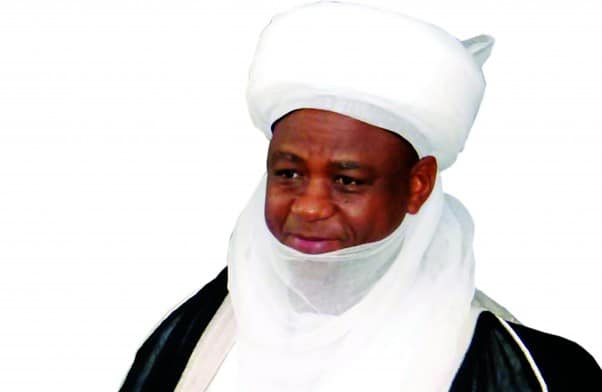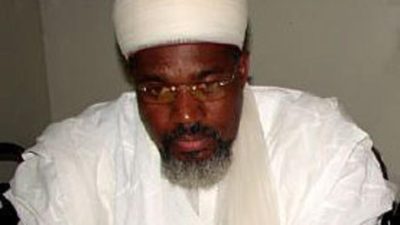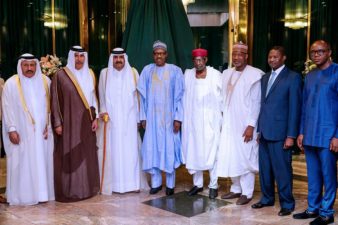By BASHIR ADEFAKA
“Some of the problems for which we blame our diversity are actually problems arising from our failure to manage that diversity. We need to look into our past as well as the present to find out how others have done it,” the Sultan said.
Sultan of Sokoto, Alhaji Muhammad Sa’ad Abubakar, attended the National Unity Summit in Abuja, the nation’s capital, on Wednesday.
While at the meeting, also attended by erudite scholars as well as other respected figures, who gathered to discuss “Nigeria: Imperative of Unity”, the Sultan gave a brief remark that simply hit the nail in the bud, for stakeholders involved in proffering solutions to the Nigerian challenge to ponder.
The summit, organised by the National Prosperity Movement (NPM), was held at the Nigerian Air Force Conference Centre, Abuja.
Sultan Abubakar particularly told the gathering how not to lose hope about the challenges facing the country, saying Nigeria is not alone in the business of building and sustaining national unity and he verifiable instances to give the hope that the diversity in the country, if properly managed, points a ray of hope that things will get better.
“Almost every modern nation states struggles with its own national unity. The United State of America for example is one of the most diverse nation and has over the 200 years of its existence tried to forge national unity and even though it has achieved tremendous gains, it is still work in progress.,” the Sultan said.
The multifaceted leader, who himself is a security personality and retired Army General, spoke in clear terms.
“In Nigeria we have the extra burden of colonization that has brought so many ethnic groups together by fiat. This could have been done by wars or famine, as it has happened in the history of many nations.
“It should be a consolation that we are not alone; for it provides us the good fortune of having lessons to learn from the success as well as the failures of others.
“We also have a range of some of the best practices from different part of the world and different historical epoch to consider and adopt to our current circumstances,” he said
Continuing in the short but loaded speech, Sultan Sa’ad Abubakar said, “Some of the obvious things to bear in mind, that the world is designed to be diverse. Nature is diverse and in diversity we find sustainability.
“Diversity is therefore a fortune and like most fortunes they need to be guarded and managed very well to realize the benefits. Rather than complain about our diversity, we should strive to master the skills of the management of this diversity.
“Some of the problems for which we blame our diversity are actually problems arising from our failure to manage that diversity. We need to look into our past as well as the present to find out how others have done it.”
Read the speech below in its original form:
BRIEF REMARKS OF HIS EMINENCE THE SULTAN OF SOKOTO, MUHAMMAD SAAD ABUBAKAR CFR, ON THE OCCASION OF THE NATIONAL UNITY SUMMIT WITH THE THEME NIGERIA: THE IMPERATIVE OF UNITY. HOLDING AT NAF CONF. CENTRE, DEC. 1, 2021.
PROTOCOL
Let me say how delighted I am to be part of this important conversation at a time when it has become imperative to discuss Nigeria’s unity. For some time now the unity of our country has been called to question and this, to say the least, has been slowing down national integration and undermining national development. Our democracy would appear to have been caught in the trap created by this phenomenon. It is therefore important we put the issues on the table and discuss them with a view to finding solutions to the problems of National Unity.
I am particularly delighted that this summit has brought together some of the most erudite scholars on the subject and some of the key political leaders in the country whose views and opinions on this subject is both weighty and potent. I am confident that this summit will unravel some of these problems and provide the solutions. The presence of the political leaders from both the ruling as well as the opposition parties, already indicates some level of unity and will hopefully guarantee implementation of solutions over time.
The significance of National Unity in modern nation state is fairly obvious; it makes the arrival at a national consensus much easier and much faster which in turn accelerates the rate of development of the nation. National unity allows political leaders to harvest citizen’s commitment and contribution in nation building and national development. National unity is one of the most effective prevention of internal conflicts that can drain the resources of the nation and derail its progress.It is therefore an essential element of modern governance and requires investment of national resources to secure it and promote it.
Almost every modern nation states struggles with its own national unity. The United State of America for example is one of the most diverse nation and has over the 200 years of its existence tried to forge national unity and even though it has achieved tremendous gains, it is still work in progress. Similarly the nations of Europe have struggled within themselves and between themselves to build their national unity over time. Europe has achieved a particular feat over time in not only keeping the different nations States united but also forging unity among European nations in forming the European Union; all these in spite of the diversity in Europe. Even China has its own diversity, which may not be obvious to some of us very far away. Indeed its’ economic success is only a measure of its achievement in national unity. Despite these achievements China is still struggling to accommodate its Muslim population.National unity is not an easy thing to achieve and is not one-off affair. The management of diversity is a continuous business which requires appropriate policies, monitoring and evaluation.
So, if it is any consolation, Nigeria is not alone in this business of building and sustaining national unity. In Nigeria we have the extra burden of colonization that has brought so many ethnic groups together by fiat. This could have been done by wars or famine, as it has happened in the history of many nations. It should be a consolation that we are not alone; for it provides us the good fortune of having lessons to learn from the success as well as the failures of others. We also have a range of some of the best practices from different part of the world and different historical epoch to consider and adopt to our current circumstances.
Some of the obvious things to bear in mind, that the world is designed to be diverse. Nature is diverse and in diversity we find sustainability. Diversity is therefore a fortune and like most fortunes they need to be guarded and managed very well to realize the benefits. Rather than complain about our diversity, we should strive to master the skills of the management of this diversity. Some of the problems for which we blame our diversity are actually problems arising from our failure to manage that diversity. We need to look into our past as well as the present to find out how others have done it.
The Sokoto Caliphate is an example of how independent but fighting Hausa States of the 17th and 18th centuries were brought together under one roof and united under a single polity, which gave them more security, boosting commerce and learning. This did not come easy. There was deliberate social engineering by the leaders of the Caliphate, as we can see from the many books they wrote. They first debated and settled on the membership of the community, who is a citizen and who is not, it was not an easy debate as the Caliphate was a plural state made up of people of diverse ethnicity and religion. They designed deliberate policies to give citizens a sense of belonging, encouraging the settlement of nomadic groups and organized urbanization.They developed policiesaround trade, taxation, organizationof artisans, and a legal system that responds to injustice and oppression, making the State to take responsibility of its citizens and creating a sense of belonging in the citizen. The Caliphate, like any human efforts, had its limitations, from which we should also learn.
It would appear that one major problem we have around our national unity and cohesion in this country is that the discourse, even among the educated, is driven more by ignorance and emotions than knowledge. We must make the discourse to be an informed one, driven by facts and figures; otherwise we can find ourselves boxed into the dialogue of the deaf, where no one understands the other. We also have to avoid confusing unity with uniformity; we don’t have to be uniform to be united. Nature is not just diverse but it is also intelligent. The lengths of our fingers are not the same, precisely because each finger has a unique role to perform in giving us the grip we need to survive. Diversity is not for nothing; we should try to understand it and indeed celebrate it. This can only happen if we ask our scholars to lead the debate.
Some of us, who attended unity schools and served in the armed forces, find it difficult to understand where the unnecessary hatred is coming from. When did this ignorance took over the mind of the nation. Recently I run into a quote that appears to be anonymous. It says, “Two people can damage a society: the one who knows and doesn’t talk and the one who doesn’t know and talks.” I think, for the good of our country, we should ask those who know to speak up and those who don’t, to shut up.
I leave you with these thoughts and thank you for listening.




